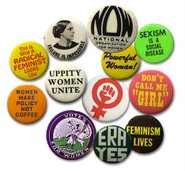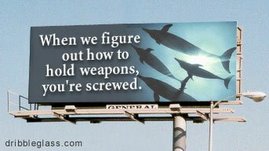
Well, better late than never, right?
I went to CSUN's fifth annual Take Back the Night rally about two weeks ago now (April 24th) and had an amazing time. I wanted to go anyway and I managed to talk my journalism prof into letting me cover it for my final writing project. (Whee!) We had to write a hard news story and a feature piece. We could also put together some graphics and take pictures if we wanted.
I had never been to a Take Back the Night rally, myself and it was quite an experience. It was amazing to see so many people come together and speak out against sexual violence. There were some men who spoke as well which I thought was great. I was afraid there wouldn't be much support from the college guys, but it was very encouraging.
After the formal speeches, we were all given candles and we marched across campus to another location. I guess the rally is usually held earlier in the year, so at 7:00 is actually dark. This looked more like Take Back the Afternoon, but it was ok. The people involved were just as motivated anyway.

Once we got to the end of the walk, there was a stage set up with a microphone and a little podium. People could come up and talk about their own experiences with sexual violence. It was the most amazing thing I'd ever seen. People got up there alone, or with friends, and told an audience of people they didn't know about rape, sexual molestation and assaults. Everyone was supportive and made sure that those who shared knew they were in a safe place.
I chose to write my feature piece about one of the girls at the open mic and one of the presenters at the formal speech portion...
(I have changed some names and other info to protect privacy.)
Madeline Hoover , a 22-year-old CSUN student, is working towards a degree in sociology and criminology. When she’s not at school or working at her job as a teacher’s assistant at San Fernando High School, she can often be found at local night clubs performing her poetry at open-mic nights. One of her most emotional pieces centers on her experience with a sexual assault.
“The first couple of times I performed it, it was really hard to read it out loud. I’m over it…but I’m not,” she said of the assault that occurred over a year ago.
Hoover, or Lady May as she’s known at the poetry clubs, has performed the piece over the past year at many different venues. She attended CSUN’s Take Back the Night rally for the first time this year and decided to share the poem during the open-mic session at the Chicano/a house. The young woman stepped up onto the little stage, and with a strong, clear voice, shared her story with the unique audience of survivors and their supporters.
“I’ve never performed the piece in front of an audience like that,” she said. “I was a little nervous.”
There are as many ways to overcome the trauma of violence against women as there are victims. For those who survive, the path to healing is often long and may lead to surprising destinations.
In the San Fernando and Santa Clarita Valleys, the Valley Trauma Center is where many victims begin to heal. According to CSUN educational psychology and counseling professor Charles Hanson, every month the center sees between 60 and 80 cases for child abuse, rape, or sexual assault. Over half of those are children under 14.
Hoover is never quite sure how the piece will be received from one audience to the next. Sometimes she can tell they don’t know handle it. Often, she will disappear to the back of the room after a performance and wait to see how the audience has received her public, spoken-word reaction to a very personal assault.
The oldest child of Nicaraguan and Syrian parents, she has a 14-year-old sister she is very protective of. “I feel like the mama bear sometimes,” she said. “She’s going to my old high school now, so everyone’s like, oh, you’re Madeline's sister.”
She recently performed the piece for some of her High School students in a new poetry workshop she is leading. She said it was important to let them know it happened to her and it can be talked about.
 As Hoover completes her third year at CSUN and plans to continue to help other women through her poetry and her degree, Jae Farkiss is hard at work at Valley Trauma Center, speaking out to try and prevent the violence.
As Hoover completes her third year at CSUN and plans to continue to help other women through her poetry and her degree, Jae Farkiss is hard at work at Valley Trauma Center, speaking out to try and prevent the violence.
Farkiss, herself a survivor of domestic violence and sexual assault in the early 80s, has worked at the Valley Trauma Center in Van Nuys for almost eight years as a Prevention Education Specialist. She speaks at schools on a regular basis, at health fairs in low-income communities, at Take Back the Night rallies and with small children at elementary schools about “good touch/bad touch.”
“I’m a very optimistic person and this job makes me feel empowered every day,” she said. “If even one person behaves differently, I’ve done my job.”
After Farkiss’ own experience with violence in a relationship, she used her skills as a writer and a journalist to run support groups and journal-writing sessions for other survivors. That work turned into a compilation book called Finding Our Voices - Speaking Out Against The Violence in 1991.
After returning to school and earning a master’s degree in Counseling Psychology, Farkiss returned to the shelter that helped saved her life, Haven House, and worked for 13 years as a counselor. She felt the work was vitally important to the individuals and to the community, but it could also be difficult.
“You have to have good boundaries,” she said. “But, I really believe in the tenacity of the human spirit.”
Farkiss also spoke at CSUN’s Take Back the Night rally and shared some of her experiences working with young people. She often asks a room full of teenagers about cat-calling young women on the street. While the boys usually say it is just a joke, the girls often express feeling of intimidation according to Farkiss.
“How many of you have ever curtailed your activities, or changed what you were going to wear, or didn’t go somewhere at night because you were worried about getting raped?” she asks. “Not a male child in any of those classrooms will raise a hand. Virtually 100 percent of the girls in every presentation I do will raise their hand
Hoover and Farkiss have both taken one of the most profound, personal violations someone can go through and redirected the pain into creative works of healing.
“I just automatically had to write about it,” said Hoover. “I didn’t know how to talk about it yet, so I wrote it down.”















 Once we got to the end of the walk, there was a stage set up with a microphone and a little podium. People could come up and talk about their own experiences with sexual violence. It was the most amazing thing I'd ever seen. People got up there alone, or with friends, and told an audience of people they didn't know about rape, sexual molestation and assaults. Everyone was supportive and made sure that those who shared knew they were in a safe place.
Once we got to the end of the walk, there was a stage set up with a microphone and a little podium. People could come up and talk about their own experiences with sexual violence. It was the most amazing thing I'd ever seen. People got up there alone, or with friends, and told an audience of people they didn't know about rape, sexual molestation and assaults. Everyone was supportive and made sure that those who shared knew they were in a safe place. 






